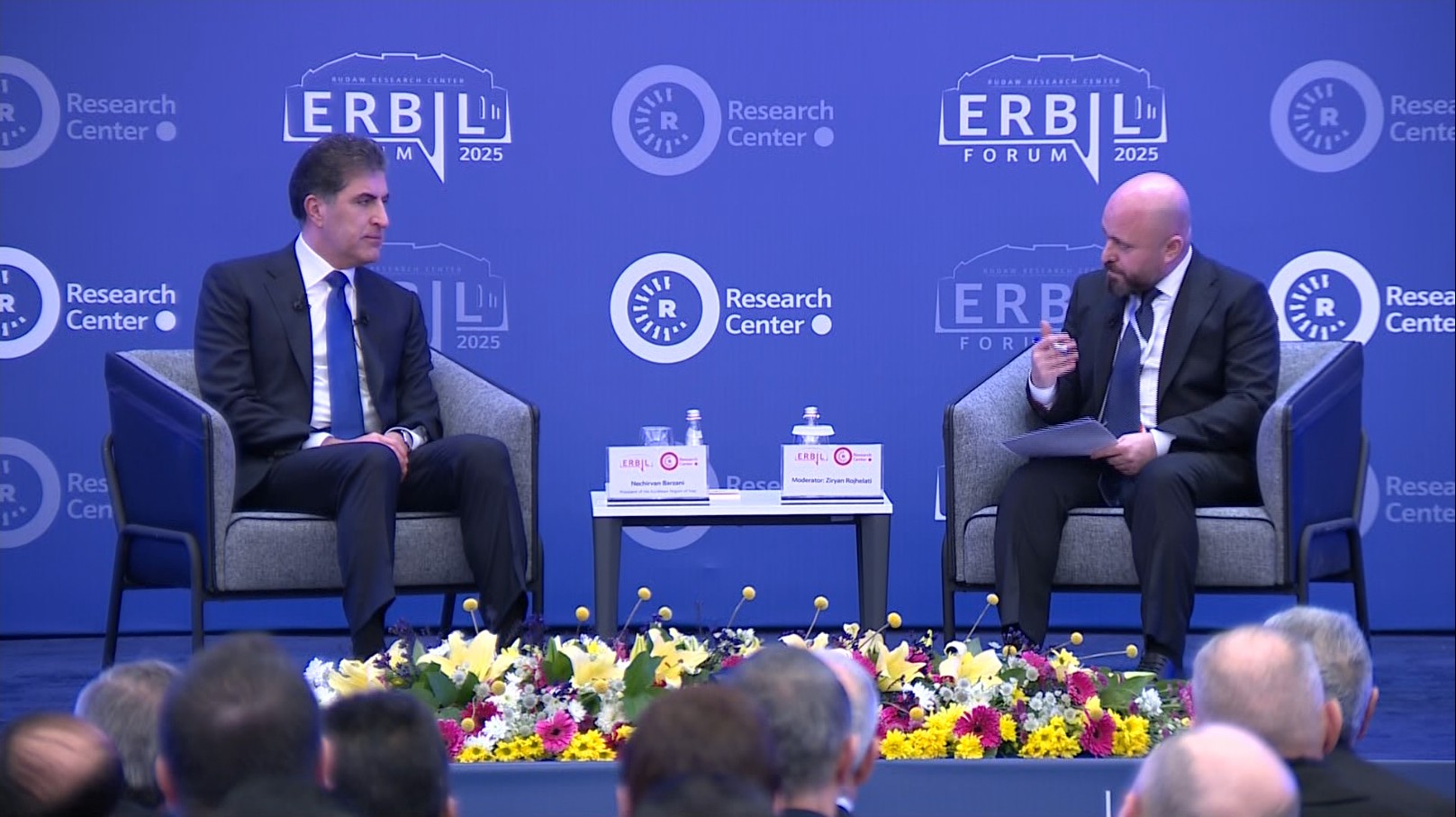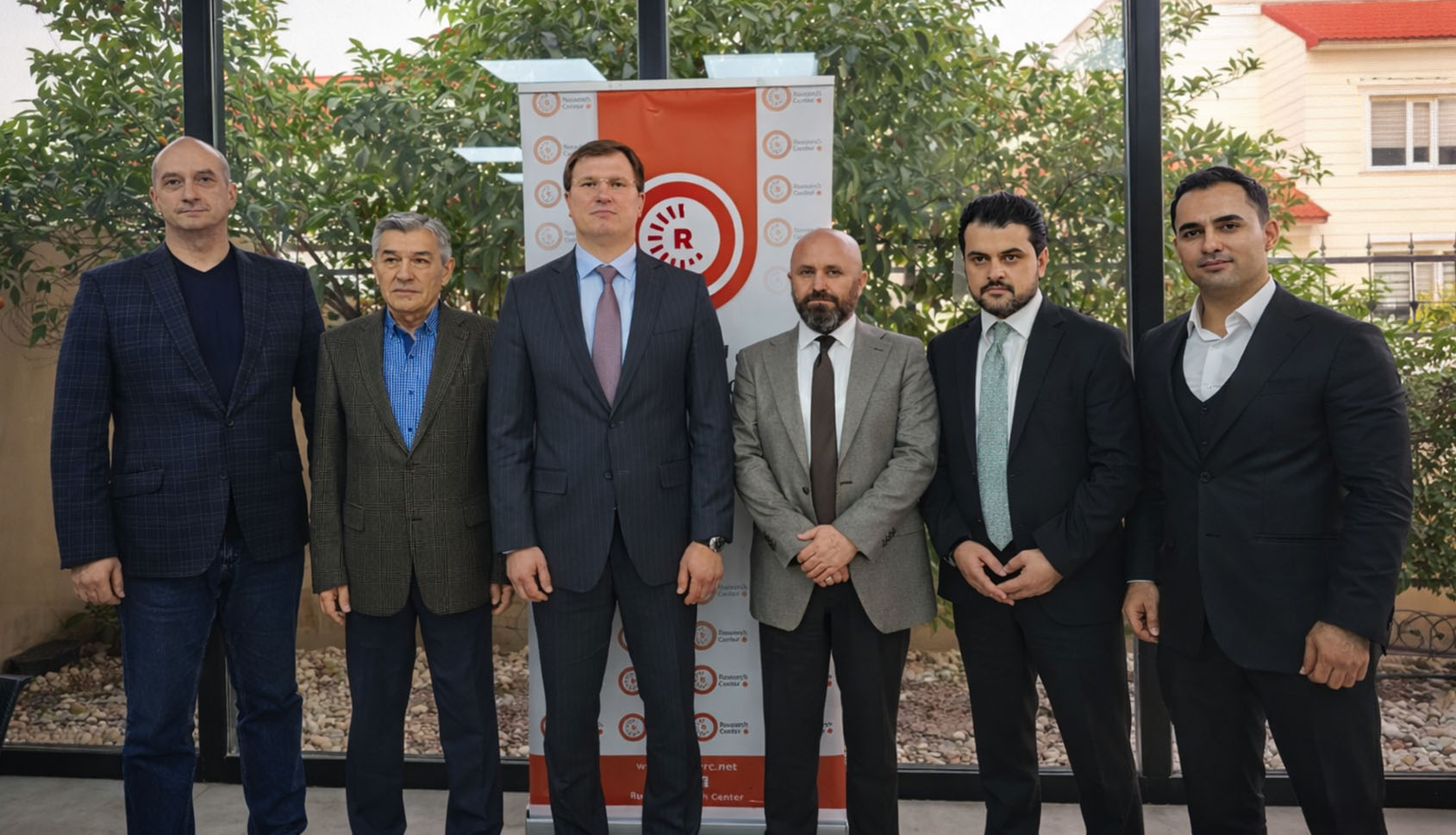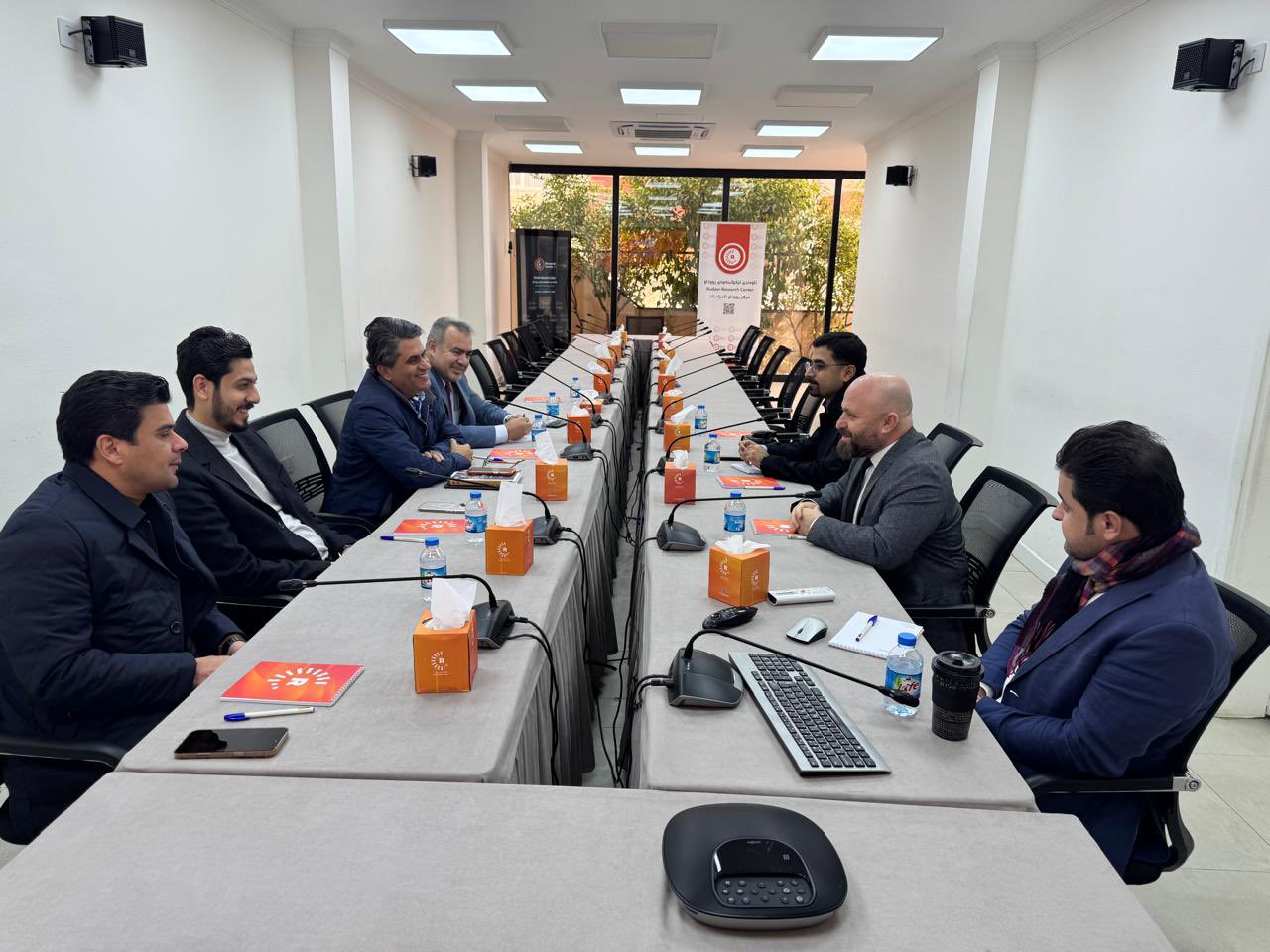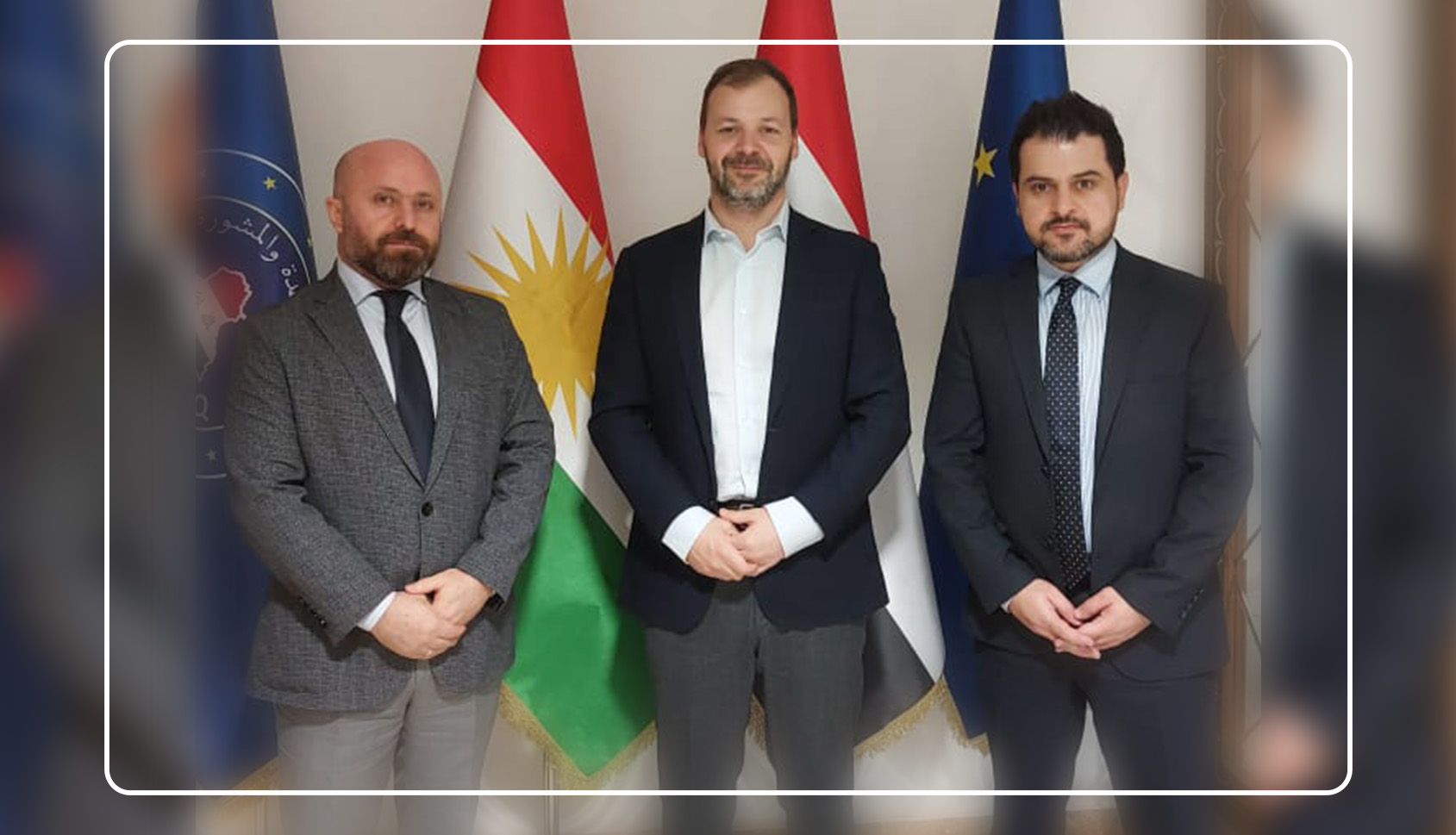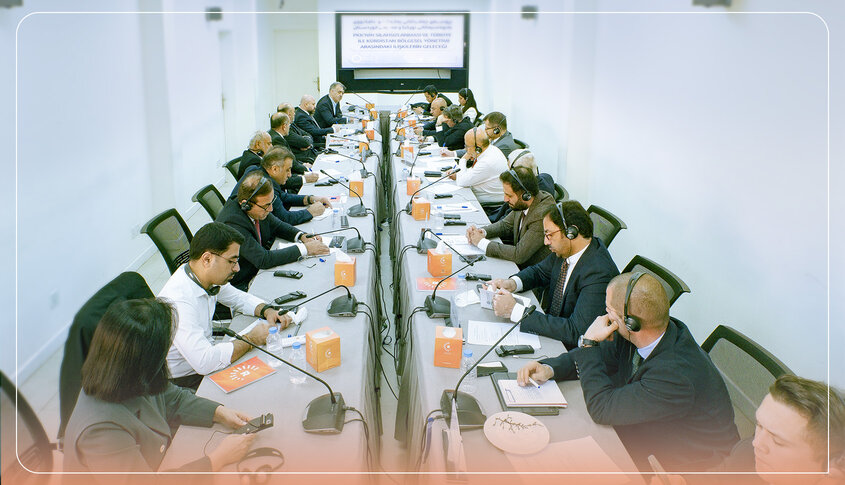Interview 02: Kurdistan Region's Vision for the Era of Uncertainty – the Impact of Regional Compromises and Divisions on Kurdistan
08-04-2025
Ziryan Rojhelati: Let me start directly with a question that many people may want to know the answer to: When will the Kurdistan Regional Government be formed?
Nechirvan Barzani: Now that we are sitting here in Erbil, the PUK and KDP delegations are engaged in serious discussions regarding the formation of the Kurdistan Regional Government. It may be questioned whether this process has taken a bit longer than expected, but we believe it is important to take the necessary time to ensure the best outcome. The PUK and KDP are currently negotiating to establish the principles of mutual interest in an agreement that will serve as the foundation for the formation of the Kurdistan Regional Government.
On the other hand, the Kurdistan Region held a very successful election last year, with a turnout of 72%. This is truly a matter of pride and gratitude to the Kurdish people for their responsible participation in the polls. At the same time, it places a responsibility on the shoulders of the PUK and KDP. As the two leading parties—first and second—they should make a serious effort to meet the expectations of the people and create an effective government that is worthy of the trust and hope of the people of the Kurdistan Region, including all its communities. Even though these talks continue, as a result, we should witness the formation of a government that is credible to the people of the Kurdistan Region. I believe we can tolerate this delay.
Ziryan Rojhelati: Elections are scheduled to take place in Iraq in October 2025. Will the delay in forming the government in the Kurdistan Region, along with the approaching date of the Iraqi parliamentary elections, negatively impact the negotiations?
Nechirvan Barzani: "I believe it is essential to keep these matters separate. The elections in the Kurdistan Region were successful, and I would like to express my gratitude to Baghdad for its cooperation and support. It is crucial to distinguish between these two issues, as the people of Kurdistan expect the formation of this government to take place much sooner. We must approach this matter with the seriousness it deserves, especially considering the 72% voter turnout and the trust the people of Kurdistan have placed in these parties. This trust compels us to expedite the government formation process."
Ziryan Rojhelati: You mentioned that the process may not take long, but at the same time, you said that the PUK and KDP should engage in further discussions to better understand each other. Does this indicate that we may see a new form of strategic agreement?
Nechirvan Barzani: "If we look at the previous strategic agreement between the PUK and KDP, we indeed established a strategic framework that benefitted Kurdistan greatly. However, the current agreement—while not necessarily called a 'strategic agreement'—serves as a strong administrative and political foundation to address governance issues in Kurdistan and resolve the challenges we face. Whether these challenges are administrative or political, the goal is to stabilize them."
Ziryan Rojhelati: As journalists, we are sometimes very curious and tend to push boundaries.
Nechirvan Barzani: No, it's okay. But please, don't be like Dr. Mohammed Ehsan. The Speaker of the Iraqi Parliament demonstrated that Iraq is democratic and has shown a great deal of tolerance.
Ziryan Rojhelati: I just wanted to ask whether the government will be formed solely by the PUK and KDP, or if other parties will also be involved.
Nechirvan Barzani: “To be honest, both the PUK and KDP have made efforts to establish a government that includes all parties. The PUK tried to form a government independently of the KDP, and vice versa, but such efforts have proven to be impractical. Certainly, other groups will be included in the government, but the key positions will be held by the PUK and KDP.”
Ziryan Rojhelati: Important changes have taken place in the region, especially in Syria, and of course, these changes seem to have an impact on the situation of the Kurds in general and the Kurdistan Region in particular. Do you not consider it necessary, as the President of the Kurdistan Region, to engage in dialogue with other parties in the region, other than the PUK?
Nechirvan Barzani: “We engage in discussions with all parties. Although we may not have held formal meetings specifically to address these matters, we maintain ongoing communication with all stakeholders and are actively discussing these issues. All parties in Kurdistan are concerned about this matter, and we consistently keep one another informed.”
Ziryan Rojhelati: An interesting point is the meetings you have with the judiciary during your visits to Baghdad. These interactions have affected relations between the Kurdistan Region and Baghdad. Do you think continuing this approach could be the right way to solve all the problems?
Nechirvan Barzani: Let me put it this way: What is the problem between Erbil and Baghdad? The biggest issue we face is that we have a so-called federal system, but in practice, what is happening in Iraq is far from a federal system. It is highly centralized.
The problem is that when Baghdad looks at Erbil, it perceives Erbil not only as a federal entity but also as a sovereign country as if it were a member of the United Nations. On the other hand, when Erbil looks at Baghdad, Baghdad’s treatment of Erbil is so centralized that it bears no resemblance to any federal system in the world. This is the reality, and I am not saying this to humiliate anyone. I have visited Baghdad several times, especially with our partners in Iraq, and we have had this discussion: “Sir, let’s sit down and clearly define the federal system.” If we resolve these issues, I believe it will benefit Iraq’s political stability.
The current complexity between us and Baghdad stems from the issue of powers—who has what powers. We may sometimes behave in a way that is more than just federal, but Baghdad’s approach toward the region is highly centralized. We need to sit down and have this conversation seriously. This conversation is key to finding a political solution to the situation in Iraq.
We have discussed this matter with the Iraqi judiciary as well. Let me be frank: Yes, when it was suggested that we should not engage with them at all, I still decided to sit down with them, and I saw a different perspective on the possibility of working together. I invited the president of the Iraqi Federal Court and asked him why he didn’t hold one of his meetings in Erbil. Erbil is part of Iraq, and we are part of Iraq. Please come and help us define federalism and clarify what federalism truly means.
I believe that if we solve this issue, we will no longer face situations where issues such as money transfers and salary payments become news stories or not even news at all. The real problem lies with the system itself. The Iraqi system is not a federal system. It is federal in name only, but in practice and content, it is far from being federal.
Ziryan Rojhelati: Did they accept the invitation?
Nechirvan Barzani: Yes, he accepted the invitation. We have a very good relationship with them at the presidency, and they have gratefully accepted the invitation to come to the Kurdistan Region.
Ziryan Rojhelati: Is everything ready for the export of oil from the Kurdistan Region?
Nechirvan Barzani: As far as Turkey is concerned, Turkey has always expressed its readiness, and there has been no issue with the Kurdistan Region exporting oil. Of course, the first thing I have emphasized several times about this oil is that, in our view, oil is a commodity. We regard it as a commodity, not a political tool. We think of it as merchandise. As a result, Iraq—especially the members of parliament who did not vote for the budget amendment—has lost about $19 to $20 billion, which is a significant amount for Iraq. Fortunately, the Prime Minister, with whom we spoke, and thanks to the Speaker of Parliament, who is here today, insisted that this amendment must be implemented as soon as possible. Now, only the technical part remains. Everything is ready. Turkey is prepared, and the Iraqi side is ready. There are some technical issues, such as how to collect the revenue from the companies, and in what manner. These are technical matters, but the principle has been decided. We expect that, in the near future, God willing, oil will be exported.
Ziryan Rojhelati: Do the US and Russia have any role in this issue?
Nechirvan Barzani: Of course, the United States is a major partner. The role of the United States has been a driving force in resolving this issue quickly because some of these companies are American companies. The United States has worked hard to address this matter. You mentioned Russia. Yes, Russia has also made efforts because some Russian companies are operating in the Kurdistan Region, but the United States, as the main partner of both Iraq and the Kurdistan Region, has played a key role in encouraging both sides. It has encouraged Baghdad, Erbil, and Ankara to resolve the issue and resume oil exports.
Ziryan Rojhelati: The suspension of oil production in the Kurdistan Region could affect the budget and salaries in the Kurdistan Region. How did you discuss this issue with Prime Minister al-Sudani?
Nechirvan Barzani:
The issue of salaries, Mr. Speaker, is something we discussed during a meeting in the State Administration Coalition. We were sitting there when the Speaker of Parliament spoke as frankly as he did here, urging that the salary problem in the Kurdistan Region be solved. The decision of the Federal Court of Iraq is clear: the Federal Court states that salaries must be separated from our political issues with Baghdad. So far, we have held a meeting together with the President of the Federal Court and the Prime Minister— the three of us. The position of the President of the Court was very clear: salaries must be separated from political matters.
In my opinion, the Prime Minister has not been indifferent to providing the salaries of the Kurdistan Regional Government (KRG). We have other issues, and certain duties must be fulfilled by the Kurdistan Regional Government. As the President of the Kurdistan Region, I believe that the KRG has engaged with Baghdad with the utmost transparency on this matter.
We hope that the budget issue will not be the central point of contention in our relationship with Iraq. We complement each other in Iraq. We will assist them in certain areas, and they will support us in others. We have a number of different issues, including Article 140 and the issue of the Peshmerga. There are many other matters that cannot all be concentrated within the budget.
The issue of salaries is a right for the employees of the Kurdistan Regional Government (KRG). The Iraqi Prime Minister, the Federal Court, and the Iraqi Parliament must ensure this right for the employees of the Kurdistan Region as part of Iraq. This is a constitutional right. All we are trying to do is reach a point where the issue of salaries is no longer newsworthy or a subject for breaking headlines.
Ziryan Rojhelati: You have spoken extensively about the importance of the Development Road Project in recent days. In fact, there is ongoing discussion about its significance for the Kurdistan Region. Where does the Kurdistan Region stand in this project? For Iraq as a whole, is it feasible, or is it merely a concept that is being discussed?
Nechirvan Barzani: You have heard the Prime Minister's remarks on the Development Road Project, which will serve as a significant gateway for Iraq in terms of political and economic stability. However, this road must be constructed in such a way that—let me phrase it this way—it functions as a strategic initiative of great importance. It should unite the country rather than create further divisions. From our perspective in the Kurdistan Region, it is crucial for us to understand the path this road will take. What route will it follow? How will it be designed? We believe it should be implemented in a manner that benefits the Kurdistan Region as well as other communities in Iraq. Such projects should be designed to foster national unity, integration, and shared interests. If the design excludes the Kurdistan Region from any benefits, it is only natural that we would not support it.
Ziryan Rojhelati: So, what is its design?
Nechirvan Barzani: At this point, I do not know the exact design of the project, but we are engaged in ongoing discussions to ensure that the Kurdistan Region also benefits from it. Undoubtedly, this project is connected to Türkiye, which has made it clear that they are ready to proceed. Türkiye’s position is straightforward—they see this as an internal Iraqi matter. We believe a solution can be found, and we hope that Baghdad views this project in a way that fosters national cohesion, ensuring that it benefits all sides.
Ziryan Rojhelati: In recent days, especially after Trump's return to office, there has been talk of US and Israeli threats to Iraq. What do you think is the way for Kurdish, Shiite, and Sunni politicians to work together to keep Iraq away from these conflicts and make independent decisions?
Nechirvan Barzani: There are two key points to consider. First, an examination of recent events reveals that the Iraqi Prime Minister and the government have shown considerable wisdom by preventing regional turmoil from spilling over into Iraq which has been suffering from conflicts since 2003, as highlighted by the Parliament Speaker, who outlined various phases of this situation. Iraqis are gradually regaining stability, with improved mobility and economic development. Frankly, any deviation from this path could lead to widespread suffering. Regarding the situation in Syria, the Prime Minister made a prudent decision to refrain from deploying armed forces into Syria, which I believe was a wise choice. Without such restraint, Iraq would likely face significant challenges
Ziryan Rojhelati: Another very interesting scenario is that the Kurdistan Region is gaining a regional role despite its current situation. What we have seen recently in the Turkish media, and perhaps in the coming days, is that the imprisoned PKK leader is calling for the peace process and addressing the issue of PKK fighters. You play a key role in facilitating this, as reported in the media. You are friends with the President of Turkey. Do you believe this process will succeed this time?
Nechirvan Barzani: I can confirm that this peace initiative is a serious and earnest undertaking in Turkey. It is more than just a tactical maneuver. Our role is to facilitate the resolution of this issue. However, it is clear that this matter cannot be resolved through military means. The call from President Öcalan will serve as a guiding framework for appropriately addressing this concern. I anticipate that this process will be lengthy, and I do not expect a swift resolution. We hope for a transition toward a political solution in Turkey that will benefit not only the Kurds and Turks but also all communities within Turkey. We have previously contributed to this dialogue, and I reaffirm that the Kurdistan Region is ready to play any role that promotes closer relations between the involved parties.
Ziryan Rojhelati: The delegation from Imrali also visited the Kurdistan Region. They met with President Barzani, Your Excellency, Mr. Masrour Barzani, Mr. Bafel Talabani, and Mr. Qubad Talabani. What message did they bring from Mr. Öcalan?
Nechirvan Barzani: They conveyed that President Öcalan had requested their visit to the Kurdistan Region to deliver a message of peace. That was the essence of their communication. At that time, they indicated that President Öcalan wished to announce this message of peace soon. His appeal was directed toward the PKK, urging them to disarm and engage in political dialogue. We expressed our support for this initiative and assured him of our readiness to assist.
Ziryan Rojhelati: Suppose the PKK accepts the call and lays down its arms. Where will the PKK's weapons be stored, and where should its leaders and members go? Have any specific projects been discussed regarding these matters?
Nechirvan Barzani: While we cannot disclose all the specifics of our discussions, the primary concern is how the PKK will respond to this call. Should they accept it, a conference may be convened by the PKK. The next steps in the process are also crucial. We have communicated our willingness to assist, but the specifics remain unclear, and we await the initial move.
Ziryan Rojhelati: Do you think there is any potential for Türkiye to allow Mr. Öcalan to engage in political activities within the country?
Nechirvan Barzani: Yes, it is possible within the context of this process, but we need to be realistic. What happens in Iraq cannot be the same model for Turkey or Iran; they are very different. However, there is one thing: This process is unfolding very carefully and with clear intent. It is essential that the process be strategic, sustainable, and involve patience. We do not rush. This is a complex process, and the issues cannot be resolved overnight; they require time and effort. However, the steps taken so far are crucial, and I hope to see positive outcomes for Turkey, the Kurds, and all the involved parties.
Ziryan Rojhelati: Last question. After the fall of Assad in Syria, you met Trump in Paris, and then you met many leaders in Munich. The focus of your speech at the press conference was that Syria was a major topic. Later, there were reports that you played a role in mediating to prevent fighting in three neighborhoods of Aleppo. Does your mediation between the SDF and the new Syrian regime, and perhaps Turkey, continue on this issue, or was it specific to that period?
Nechirvan Barzani: In the early days, our primary concern was how we could protect the Kurds in Aleppo. Truly, Turkey played a significant and decisive role in this matter. We thank the Turkish state for staying in contact with us and doing what they could, especially during those first two or three days when we were extremely concerned about the three Kurdish neighborhoods in Aleppo. But thankfully, I must express my gratitude to the President, the Foreign Minister, and the Head of Intelligence. They were all very helpful in preventing any problems, and indeed, no problems arose.
Ziryan Rojhelati: Was the initiative yours?
Nechirvan Barzani: Yes, the initiative was ours. It is our duty; they are our brothers in Syria. When the situation reached a point where they were facing difficulties, we saw it as our responsibility to help them as much as we could, and we will continue to support them. From that day until now, the Kurdistan Regional leadership—myself included, as well as others—has been working tirelessly on how we can assist our brothers there. Our message to these friends has been clear: You must find your place within the political process in Syria. You shouldn't wait to be invited; you should go to Damascus yourselves. The Kurds must actively participate in the political process in the new Syria. What happened in Syria was not only a surprise to us, but even Ahmed Shara himself was caught off guard by what occurred. It was unexpected. I don’t believe he anticipated things would unfold this way. This wasn’t part of a plan; it was a collapse, much like what happened in Mosul in 2014.
Regarding Ahmed Shara, the situation was the same. I believe they had planned a specific operation for the Aleppo area, but after the collapse, they moved to Aleppo. This is the reality. If you look at the history of this group, you may question whether what they say is true or not. However, on the other hand, if you consider the messages they've sent after coming to power, all their messages indicate they want to resolve Syria's problems. If their policy is indeed focused on solving Syria's issues, I think everyone should assist them in their efforts. On the other hand, we are concerned because we feel they want to do this through centralization. Syria cannot be governed in such a centralized manner. Syria is a multi-ethnic and multi-religious country, and all sides must be included. If all sides are not accounted for and allowed to participate in the political process of the new Syria, the process will certainly fail.

